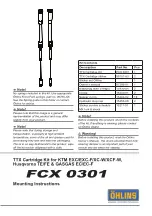
8 - 2
BeneVision N1 Patient Monitor Operator’s Manual
8.3
ECG Display
The following figures show the ECG waveform and numeric areas. Your display may be configured to look
slightly different.
NOTE
•
The ECG numeric area and waveform area are configured to be different for different lead type and
ECG settings.
8.4
Preparing for ECG Monitoring
8.4.1
Preparing the Patient Skin
Proper skin preparation is necessary to ensure good signal quality at the electrode sites, as the skin is a poor
conductor of electricity. To properly prepare the skin, choose flat areas and then follow this procedure:
1.
Shave hair from skin at chosen electrode sites.
2.
Gently rub skin surface at sites to remove dead skin cells.
3.
Thoroughly cleanse the site with a mild soap and water solut6ion.
4.
Dry the skin completely before applying electrodes.
8.4.2
Applying Electrodes
To connect ECG cables, follow this procedure:
1.
Check that electrode packages are intact and the electrodes are not past the expiry date. Make sure the
electrode gel is moist. If you are using snap electrodes, attach the snaps to the electrodes before placing
electrodes on the patient.
2.
Place the electrodes on the prepared sites. Make sure that all electrodes have good skin contact.
3.
Connect the leadwires to the patient cable if not already connected.
4.
Plug the patient cable into the ECG connector.
NOTE
•
Store the electrodes at room temperature.
•
Only open the electrode package immediately prior to use.
•
Never mix patient electrode types or brands. This may lead to problem due to impedance mismatch.
(1) ECG lead label of the displayed waveform
(2) ECG waveform gain
(3) ECG filter mode
(4) Notch filter status
(5) Paced status: If
Paced
is set to
Yes
,
is displayed. If
Paced
is set to
No
,
is displayed.
(6) Pace pulse mark: If
Paced
is set to
Yes
, the pace pulse markers “|” are displayed corresponding to
detected pace pulse on each ECG waveform.
(1) (2) (3) (4) (5)
(6)
















































